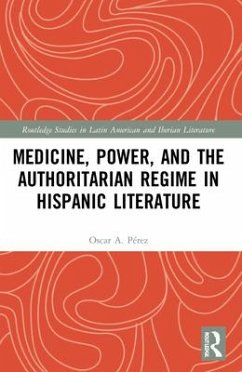This book offers a substantial examination of how contemporary authors deal with the complex legacies of authoritarian regimes in various Spanish-speaking countries. It does so by focusing on works that explore an under-studied aspect: the reliance of authoritarian power on medical notions for political purposes.
From the Porfirian regime in Mexico to Castro's Cuba, this book describes how such regimes have sought to seize medical knowledge to support propagandistic ideas and marginalize their opponents in ways that transcend specific pathologies, political ideologies, and geographical and temporal boundaries.
Medicine, Power, and the Authoritarian Regime in Hispanic Literature brings together the work of literary scholars, cultural critics, and historians of medicine, arguing that contemporary authors have actively challenged authoritarian narratives of medicine and disease. In doing so, they continue to re-examine the place of these regimes in the collective memory of Latin America and Spain.
From the Porfirian regime in Mexico to Castro's Cuba, this book describes how such regimes have sought to seize medical knowledge to support propagandistic ideas and marginalize their opponents in ways that transcend specific pathologies, political ideologies, and geographical and temporal boundaries.
Medicine, Power, and the Authoritarian Regime in Hispanic Literature brings together the work of literary scholars, cultural critics, and historians of medicine, arguing that contemporary authors have actively challenged authoritarian narratives of medicine and disease. In doing so, they continue to re-examine the place of these regimes in the collective memory of Latin America and Spain.

